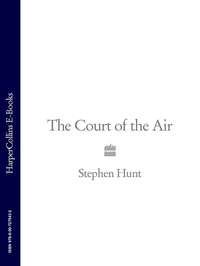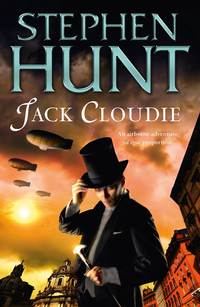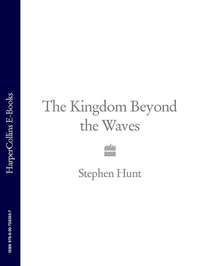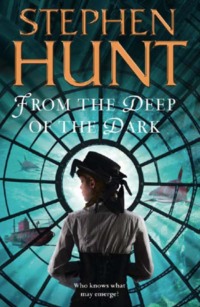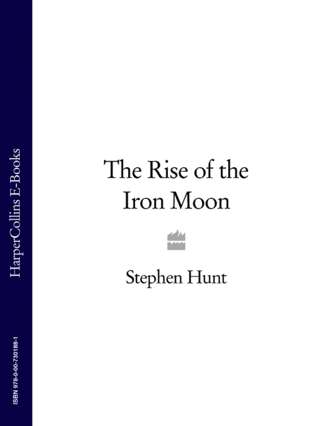
Полная версия
The Rise of the Iron Moon
‘You think so?’ The warder shook his head. Underestimating an opponent. Shocking. Hadn’t his tutors knocked any sense into him when he had first been apprenticed into the Court of the Air’s service?
The lad fingered the red lever to the left of the door, a wax seal protecting the metal switch, proving it was unbroken and had never been used. ‘Decompression throw for the cell?’
‘Yes.’ Warder Twelve pointed to a bigger lever at the end of the corridor. ‘That one up there will flush the whole level, in case there’s a mass breakout attempt. Back in the control room we can blow the entire aerosphere and disconnect all corridors into the rest of the city if it cuts up really rough across here.’
‘Have you ever had to blow a cell?’
‘On my watch?’ said the warder. ‘Once, seven years back. The science pirate Krook. He had decrypted the transaction-engine lock on his cell and was working on the last of his door bolts. He was a master of mesmerism and had hypnotized the warder walking his level. We killed Krook from upstairs. He left us no choice in the matter.’
The lad nodded. Explosive decompression, a couple of seconds choking in the slipstream of the troposphere, then unconsciousness long before the impact of a mile-high fall from the dizzying height of the Court’s levitating city removed his mischief from the face of the world. A fitting fate for an enemy of the state.
The lad looked up at the card above the next armoured door. It was purple, with the numeral one stencilled across it. ‘That’s the first time I’ve seen that colour over here.’
‘A P1. So, you’ve a taste for the strong stuff?’ noted the warder. ‘Do you really want to see who’s inside this cell?’
‘I—’ he hesitated. ‘I think so.’
Warder Twelve laid his hand on the viewing slit. ‘Then gaze upon Timlar Preston!’
Timlar Preston? But this was just a man, not an ogre. Old and thin, in a cell wallpapered by white sheets, every inch thickly pencilled with formulae and diagrams. He was standing pushed up against a wall – so close you’d think he was trying to draw warmth from the riveted metal, his pencil scratching in ever smaller circles, the writing increasingly tiny now there was hardly any space on the papers left. He turned around to gaze at the viewing slit, a flash of wild eyes and wispy silver hair, then returned to his scribbling.
‘He can see us?’ asked the lad. ‘I was told that the door’s cursewalls allowed one-way viewing only?’
‘He always knows when we’re watching him,’ said Warder Twelve. ‘Don’t ask me how. There’s a touch of the fey about him, if you ask me.’
The greenhorn gazed into the cell again. Timlar Preston didn’t seem like much, certainly not the man who had nearly destroyed the Kingdom of Jackals during the Two-Year War, the Great War, the foreigner whose weapons had propelled the hell of conflict deep into the Jackelian counties. He was from Quatérshift, that much you could see, a dirty shiftie, no honest, round jowls of the Jackelian yeoman for this one; no honest fat from a diet of roast beef, beer and jinn. Thin, wiry, with a proud nose that lent him an hauteur distinctly lacking in his mad scratchings.
‘You still think you have what it takes to keep such as he away from our shores?’ asked Warder Twelve.
The lad held his tongue. Inside the cell, Timlar Preston was turning in a circle, waving his pencil. Conducting an imaginary symphony of madness.
‘You want to keep him dancing for us, rather than inventing bloody great devices of war for the shifties to use against your fellow Jackelians? Men like him aren’t controlled by this—’ the warden slapped the transaction-engine drum turning on the armoured lock. ‘They are controlled up here!’ He tapped his skull. ‘Walking the cells with a toxin club swinging from your hand won’t be your vocation in the prison spheres, any more than tapping the ivories on your key-writer was your job when you worked over in analysis. Getting into the minds of people like Timlar Preston, that’s the task for you and me. We drug his food once a week; change his pencil for one slightly fatter, slightly longer, a different shade. To keep him off balance, you see? Then we take his sketches, the ones we can understand, and change some of the formulae. Forgery section uses his handwriting to do it for us. Just enough to keep him wondering if it was he who wrote the maths or one of us. Just enough to keep him wondering if he’s going mad. And while he’s doing that, he’s not trying to break the hex we’ve got laid around his cell. He’s not thinking of creating weapons that could lay waste to our country.’
Timlar Preston’s mad dance in the centre of the cell had ended, the genius arriving at the other side of the viewing slit in three long, low strides. His shriek was relayed by the voicebox next to the cell door, the piece of paper he had been writing pushed up against the viewing slit, full of spirals, a procession of seashell-like geometries drafted with insane precision. ‘They’re coming! They’re coming!’
The lad looked at Warder Twelve. ‘What is he talking about?’
‘Something new,’ said Warder Twelve. ‘He’s been ranting about it for days. He’s due for the old sleepy soup and a few mind games at the end of this week. When we search his cell, we’ll probably find the notes on whatever his latest obsession is.’
‘I can hear him!’ Preston yelled. ‘Talking to me. Telling me what to do. What we need to do to survive.’
Warden Twelve flicked the sound off the voicebox and closed the viewing slit. ‘Back to the lifting room; the next level down is where we keep the prisoners with special powers– all the fey ones, the sorcerers and witches. You’re going to love them.’
They walked away, oblivious to the muffled banging on the other side of the cell door. Timlar Preston howling and throwing his papers around the cell.
Commodore Black looked over at his friend Coppertracks. It would take someone very used to steammen ways to tell that the scientist was nervous. But then, the commodore had lived with the steamman under the roof of Tock House for long enough that he could read the patterns of energy that danced under his iron friend’s transparent crystal skull like other men could read furrows in a brow or the nervous drum of fingers on a desk. And it took a lot to make one of the metal creatures nervous.
The patter of polite applause from the direction of the stage indicated that the previous presentation in front of the massed ranks of the Royal Society was going well. Well for the presenter, but not so well for Coppertracks’ chances of extracting the full financial and intellectual backing of the society if they squandered their time and resources on too many of his rivals’ proposed projects. It was a competitive business, this society of ideas, mused the commodore – as if the Kingdom of Jackals only had so much deck space for what its people thought about, and the pondering of one belief – one truth – left less room for any others to thrive.
‘You are sure you have all of my slides in the correct order?’ asked Coppertracks.
‘You know that I do,’ said the commodore. ‘Haven’t I practised enough on your blessed magic lantern back at the house? You keep your attention on the audience, I shall give your scientist friends a visual display of your genius that would put to shame the lantern operators of the theatres along Lump Street.’
‘There is really no need for you to assist me, dear mammal,’ said Coppertracks. ‘I could have brought one of my mu-bodies to operate the projection apparatus.’
Commodore Black nodded, but didn’t point out that having one of the steamman’s metal drones capering about the stage would only serve to remind the mainly warm-blooded races sitting in the auditorium that Coppertracks was a slipthinker – his genius so large he had to distribute his consciousness among multiple iron bodies. Back home in the Steammen Free State, they treated Coppertracks as royalty. Here in the Kingdom of Jackals, he was just a metal clever clogs who constantly reminded the members of the Royal Society how dim most of them were in comparison.
‘Now,’ said Coppertracks, rubbing nervously at his metal hull, polishing it to a high, gleaming sheen, ‘where is Molly softbody? She must have picked up that slide I changed by now.’
‘I have,’ said a voice behind them. It was Molly Templar, the third member of the trio that shared the comforts inside Tock House’s walls. Molly was sweating slightly under her long red hair – she had obviously been straining to get to the presentation in time. ‘It turned out the chemist finishing off your last slide was one of the more persistent devotees of my writing. He wouldn’t hand over the damn thing until I had signed at least two of my novels for him.’ She produced a little glass square, chemically etched with one of the steamman’s images.
Molly peered round the curtain to see how well the current presenter’s talk was going, then ducked back and lifted a copy of the Middlesteel Illustrated News out of her coat pocket, passing it to Coppertracks. ‘Read the cover story. It’s a pity your presentation isn’t proposing a superior design for airship engines. The merchant marine has grounded all its flights – apparently dust from the wake of Ashby’s Comet has fouled the fleet’s motors. While they’re being checked and cleaned out on the airship fields, the cost of narrowboat berths and stagecoach tickets is rising in every county.’
Coppertracks showed the commodore the newspaper’s cover illustration, a swarthy canal boat owner with a long queue of Jackelian citizenry alongside his narrowboat and his oversized cupped hands full of coins. The speech bubble read: ‘A ride, good damsons and sirs? I think I may yet take you for a ride.’
‘Lucky then, that the three of us have no mortal plans for travelling beyond the capital,’ said the commodore. ‘Let them jack their prices up to a guinea a ticket. We can warm ourselves by the fire in Tock House and wait for winter to come while Coppertracks tinkers with his science, you pen your novels, and I take my well-earned rest from the trials and tribulations fate has sent nipping at my heels.’
One of the society administrators slipped behind the crimson curtain. ‘Aliquot Coppertracks, you are on, sir. If you don’t mind keeping your presentation to ten minutes, with five for questions, we are running a little behind at the moment.’
‘Ten minutes, lad?’ interjected the commodore. ‘If we can’t make the members of your fine society see the bright fury of Coppertracks’ brilliance in half that time, then they haven’t half the wits they were born with.’
The administrator moved aside so that the commodore and Molly could pass by to the table where their magic lantern was burning oil in front of an array of mirrors. Coppertracks rolled carefully to the lectern, staring out at the sea of faces – sombre stovepipe hats and conservative dress the order of the day among the race of man. A few thinkers of the Kingdom of Jackals’ other races were present too: steammen, graspers, a handful of lashlites – lizard-winged sages whose adherence to their aural teachings had driven them to seek wider learning when the sagas of their gods had been mastered and exhausted.
Coppertracks motioned to the commodore to project the first slide onto the white screen behind him, when a buzz of excitement arose from the audience, interrupting the start of the steamman’s presentation. Molly nudged the commodore.
Commodore Black looked around to see the source of the commotion and groaned. It was him. Making a fashionably flamboyant late entrance – no doubt perfectly timed to put Coppertracks off. Behind the lectern, the energy swirl under Coppertracks’ crystal skull had turned spiky. The steamman equivalent of a back arching as he recognized the face of his rowdy adversary. For every academic paper Coppertracks published, Lord Rooksby could be sure to make it into the journals with a contrary view. While Coppertracks shared his metal race’s methodical, steady brilliance – progress cautiously but steadily advanced over a lifetime of many centuries – Lord Rooksby was the exemplar of the race of man’s short-burn approach to science. Erratic leaps of faith and intuitive gambling that sometimes paid off, but often floundered with a heavy landing. Of course Lord Rooksby would be here at the Royal Society meeting. He couldn’t resist the opportunity for a little mischief at the expense of his steamman rival. Rooksby believed that Jackals did best when it was the hand of mankind that ruled it, and that the place of steammen, graspers, craynarbians, lashlites and the other creatures of the nation was walking two steps well behind his race’s polished calf-leather boots.
‘Don’t mind me,’ said Lord Rooksby, sweeping back his velvet-lined cloak with a flourish. The two women he had brought along sat down on either side of him and looked up adoringly at the slim, elfin-chested scientist, as if his every aristocratic word contained a new insight into the nature of the universe. ‘No, really, don’t look at me. I am fascinated to hear what we’re being asked to support this year.’
At this, his escort broke into giggles and he rested his polished boots up on the seat in front, prompting an angry glance back from its occupant.
‘Go on, man,’ whispered the commodore, willing his friend to ignore the most persistent of his scientific antagonists.
Coppertracks began. ‘I am before you, seeking your indulgence to reveal the findings of my latest research. Research that has been aided by my fellows back in the Steammen Free State.’
That drew a murmur of appreciation from the assembled scientists. If King Steam was backing Coppertracks’ endeavours, then there was as like to be something of note to be heard here this day. The people of the Steammen Free State held to their secrets fast, and getting direct aid from the monarch of the kingdom of the metal was often like pulling teeth.
‘As you may be aware,’ said Coppertracks, ‘the home of my people in the mountains of the Mechancian Spine is both cold and high, constructed at an altitude beyond that of any Jackelian city.’
‘A geography lesson,’ interrupted Lord Rooksby, his voice carrying from the back of the hall. ‘Capital stuff.’
‘A geography,’ explained Coppertracks, ‘which means the procession of the stars and bodies celestial above us can be viewed without hindrance, without the smogs and rains of Jackals. A geography most conducive to astronomical observation, which is why—’ Coppertracks paused to wave his iron hands excitedly, ‘King Steam sponsored the construction of a new observatory in my homeland, equipped with the latest astronomical apparatus, some of which I myself had the honour of designing.’
Commodore Black grinned to himself and nudged Molly back. So, the old steamer had made good use of his visit to the Free State last summer after all. Lord Rooksby was frowning in his seat. This wasn’t the way things were meant to be going at all. It was all running far too smoothly for his adversary.
‘This apparatus has allowed my people to peer deeper into the celestial void than ever before,’ said Coppertracks. ‘To observe the celestial bodies that accompany our own world’s procession around the sun at greater clarities than previously thought possible.’
That drew a few dark mutters from the crowd. Coppertracks was taking the side of the radical argument that said that the Earth orbited the sun, rather than the sun and other bodies paying due homage to their home by orbiting the Earth at the centre of all things.
‘Not decided, not decided,’ groused a few dissenters.
‘Well,’ called out Lord Rooksby. ‘It appears you’ve already got the support of your great King Steam, so what do you need the aid of mere softbodies like us for?’
‘Dear mammal,’ said Coppertracks, raising the amplification on his voicebox, ‘I am here, among other things, to share the wonders of the universe with you. For instance, many of us have speculated that the number of celestial bodies that share our world’s procession around the sun is uncommonly high at forty-six. This new apparatus will help us discover—’
‘Discover what?’ boomed Lord Rooksby. ‘Are we mere astrologers now, or noble leaders of science? Have you, sir, uncovered any new comets with which to unsettle the great unwashed masses?’
This drew a peal of laughter from the crowd. Ashby’s Comet just two months gone, had left a trail of broken-in windows and broken-up riots when various factions in the capital had sought to make mischief out of the auguries of ill fortune said to arrive with the crimson harbinger of doom.
Lord Rooksby nodded sagely, as if he exposed a great truth this day. ‘If I wish my fortune to be read in the stars, I have a gypsy caravan that calls at my house in the shires each summer. Maybe the gypsies can sharpen your wits while they sharpen my knives, old steamer!’
‘This is science,’ protested Coppertracks. ‘Science of the deepest sort. There is much our neighbouring celestial bodies have to teach us about our own home.’ He motioned to the commodore and the hulking u-boatman advanced to the next slide, an image of a fiery red circle captured bright against the darkness of the face of night.
‘Behold, Celibra, a world – I believe – of inferno temperatures. This is a celestial body fixed at a distance from the sun almost identical to that of our own world, yet in composition and temperament it seems to be radically different from the systems of life we are familiar with here on Earth, a world that is almost certainly uninhabitable.’ The next slide in the rotation clicked forward. ‘Now this is an image of our moon: observe the tinges of green we have picked up beneath the cloud cover – could it be that the lunar surface has forests as dense as any found in the jungles of Liongeli?’
‘Cheese!’ laughed Lord Rooksby. ‘Obviously it is nothing but green gas rising from the finest cheese.’
There was more laughter from the audience.
The commodore shook his head in annoyance. Coppertracks was leading the audience in too fast – ploughing ahead at ramming speed. He should have been revealing his findings at a rate of knots the scientists’ conservative bent could more readily absorb and adjust to. The crowd were not, for the main, steammen who could share new information between themselves with a joining of cables and the implicit trust that came from such networking. They were minds of slow meat that needed wheedling and convincing.
‘Let us gaze next, my colleagues in science, towards our world’s nearest neighbour in the dark, cold void: Kaliban.’
The red world came onto the screen, the light from the magic lantern catching the swirl of smoke from mumbleweed pipes as several of the assembly lit up. Coppertracks waved an iron hand at the screen. ‘Long linked in song and saga to various gods of war, instead, in reality we find a dead, dry world of crimson dunes and – perhaps – something else.’
The commodore advanced to the next slide, a high-magnification view of the celestial body.
‘The shooting stars lighting up our skies of late have not all been debris from the tail of Ashby’s Comet. I have traced some of the rocky projectiles back to what I think must be volcanic eruptions on the surface of Kaliban. And see what else I discovered during my explorations. Observe the fine splintering of lines you can see across the celestial sphere’s surface. I have analysed the geometry of these lines and come to the conclusion that they are artificial in nature.’
A hush fell over the crowd.
‘Yes, artificial. I believe these lines are a series of canals, vaster and far more sophisticated than the waterways of our own Jackals. A universal transport system that may once have rivalled the timetables of the merchant marine of the Royal Aerostatical Navy in its ability to transport cargoes and people around their world.’
‘Poppycock,’ said Lord Rooksby. ‘You see a splintering of rock fissures and detect the hand of intelligence behind it! I have never heard such arrant nonsense. It is well known that you share the roof of your home with an author of celestial fiction, one Molly Templar, whom I see has accompanied you here tonight. I believe you have spent too much time pondering her last tome of facile writings rather than upon serious scientific investigations.’
Molly made to leap up from their projecting lantern, but the commodore pulled her back.
‘I’m going to go up there and shove my last tome of facile writings down his smug, grinning—’
‘Leave him be, lass,’ whispered the commodore. ‘Or at least, let’s be leaving the long-haired popinjay until later. A fight in here is what he wants, anything to embarrass our old steamer in front of his fellow scientists.’
She saw enough reason in the commodore’s words to shrug off his hands and sit down.
‘Nonsense is it?’ retorted Coppertracks, pointing an iron hand at Lord Rooksby. ‘Then by my cogs, how do you explain this?’ Commodore Black advanced to the next slide, an amorphous grey mass whose peripheries were tinged with red.
‘Sir, I do not even know what that unsightly mess you have so kindly brought before us is.’
‘That is because you do not have access to the transaction engines of the Steammen Free State,’ said Coppertracks. ‘Some of the most advanced thinking engines of their kind in the world. When the geometries and shadow lines are resolved and cleaned using the power of our transaction engines, we see instead…’
The commodore shook his head. That was a terrible mistake, reminding the Jackelian audience that their civil service’s great engine rooms beneath Greenhall had a rival high in the mountains of Mechancia – a rival with steam-driven thinking machines that made their own transaction engines look like wind-up toys sold over the counter at Gattie and Pierce.
‘…this!’
The commodore advanced to the next slide, the image of a stone-carved face filling the screen, a scale written across it indicating that the face was three hundred miles across in width, four hundred from neck to skullcap.
Coppertracks continued over the hush of the crowd. ‘This incredible carving is clearly humanoid – the features of the race of man, or something close to it. An artefact on a scale more massive than any we have attempted here on Earth.’
‘Clearly, sir,’ shouted Lord Rooksby, ‘you have taken leave of your senses. Give me but a lump of coal from your boiler’s furnace and I will whittle you a shape as pleasing to the eye with my penknife.’ Another member of the audience lifted a piece of coke from the boiler bin of the steamman sitting next to him and tossed it towards Lord Rooksby. The aristocratic scientist seized it and raised it towards the ceiling. ‘Behold, damsons and gentlemen of the Royal Society – I give you the miraculous face of the great Pharaoh of Kaliban. Give me but a hundred years of erosion, a real-box camera and the poorly written plot of a penny dreadful, and I shall carve for you an entirely new branch of science – and for my next trick I will find you the face of the Man on the moon and send an airship to converse with the ice angels of the coldtime.’
The crowd followed Lord Rooksby’s lead and began to bray Coppertracks down in annoyance.
‘You fools,’ cried Coppertracks, pointing to the image on the screen. ‘Can you not see the evidence before your eyes? There was once life on Kaliban, life capable of constructing canal works and carving vast effigies from their mountains.’
‘Celestial fiction, sir,’ hooted Lord Rooksby, sensing that now was the time to steer events towards the projects favoured by his own lickspittles. ‘This is pure celestial fiction.’
‘Life!’ called Coppertracks, beseeching the massed ranks of the Royal Society. ‘Life that might be able to converse with us, if we would but make the effort.’
A low wailing echoed about the assembly chamber now, Coppertracks struggling to be heard over the eerie heckling. ‘My proposal is to build a colossal transmitter capable of receiving and generating vibrations across the void. We have already seen that the vicinity of our sun is blessed with an uncommonly large quantity of celestial bodies, many that would appear to be candidates for bearing life.’




